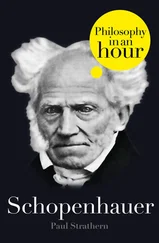Thomas Whittaker - Schopenhauer
Здесь есть возможность читать онлайн «Thomas Whittaker - Schopenhauer» — ознакомительный отрывок электронной книги совершенно бесплатно, а после прочтения отрывка купить полную версию. В некоторых случаях можно слушать аудио, скачать через торрент в формате fb2 и присутствует краткое содержание. Жанр: Биографии и Мемуары, foreign_religion, Философия, foreign_psychology, foreign_antique, foreign_prose, на английском языке. Описание произведения, (предисловие) а так же отзывы посетителей доступны на портале библиотеки ЛибКат.
- Название:Schopenhauer
- Автор:
- Жанр:
- Год:неизвестен
- ISBN:нет данных
- Рейтинг книги:3 / 5. Голосов: 1
-
Избранное:Добавить в избранное
- Отзывы:
-
Ваша оценка:
- 60
- 1
- 2
- 3
- 4
- 5
Schopenhauer: краткое содержание, описание и аннотация
Предлагаем к чтению аннотацию, описание, краткое содержание или предисловие (зависит от того, что написал сам автор книги «Schopenhauer»). Если вы не нашли необходимую информацию о книге — напишите в комментариях, мы постараемся отыскать её.
Schopenhauer — читать онлайн ознакомительный отрывок
Ниже представлен текст книги, разбитый по страницам. Система сохранения места последней прочитанной страницы, позволяет с удобством читать онлайн бесплатно книгу «Schopenhauer», без необходимости каждый раз заново искать на чём Вы остановились. Поставьте закладку, и сможете в любой момент перейти на страницу, на которой закончили чтение.
Интервал:
Закладка:
Of Schopenhauer's expositions of his pessimism it would be true to say, as Spinoza says of the Book of Job, that the matter, like the style, is not that of a man sitting among the ashes, but of one meditating in a library. This of course does not prove that they are not a genuine, if one-sided, rendering of human experience. All that can be said is that they did not turn him away from appreciation of the apparent goods of life. His own practical principle was furnished by what he regarded as a lower point of view; and this gives its direction to the semi-popular philosophy of the Parerga . From what he takes to be the higher point of view, the belief that happiness is attainable by man on earth is an illusion; but he holds that, by keeping steadily in view a kind of tempered happiness as the end, many mistakes may be avoided in the conduct of life, provided that each recognises at once the strength and weakness of his own character, and does not attempt things that, with the given limitations, are impossible. Of the highest truth, as he conceived it, he could therefore make no use. Only by means of a truth that he was bound to hold half-illusory could a working scheme be constructed for himself and others. This result may give us guidance in seeking to learn what we can from a thinker who is in reality no representative of a decadence, but is fundamentally sane and rational, even in spite of himself.
CHAPTER II
THEORY OF KNOWLEDGE
The title of Schopenhauer's chief work is rendered in the English translation, The World as Will and Idea . Here the term 'idea' is used in the sense it had for Locke and Berkeley; namely, any object of mental activity. Thus it includes not merely imagery, but also perception. Since Hume distinguished ideas' from 'impressions,' it has tended to be specialised in the former sense. The German word, Vorstellung , which it is used to render, conveys the generalised meaning of the Lockian 'idea,' now frequently expressed in English and French philosophical works by the more technical term 'presentation' or 'representation.' By Schopenhauer himself the word 'Idea' was used exclusively in the sense of the Platonic Idea, which, as we shall see, plays an important part in his philosophy. The distinction is preserved in the translation by the use of a capital when Idea has the latter meaning; but in a brief exposition it seems convenient to adopt a more technical rendering of Vorstellung ; and, from its common employment in psychological text-books, I have selected 'presentation' as the most suitable.
The first proposition of Schopenhauer's philosophical system is, 'The world is my presentation.' By this he means that it presents itself as appearance to the knowing subject. This appearance is in the forms of time, space and causality. Under these forms every phenomenon necessarily appears, because they are a priori forms of the subject. The world as it presents itself consists entirely of phenomena, that is, appearances, related according to these forms. The most fundamental form of all is the relation between object and subject, which is implied in all of them. Without a subject there can be no presented object.
Schopenhauer is therefore an idealist in the sense in which we call Berkeley's theory of the external world idealism; though the expressions used are to some extent different. The difference proceeds from his following of Kant. His Kantianism consists in the recognition of a priori forms by which the subject constructs for itself an 'objective' world of appearances. With Berkeley he agrees as against Kant in not admitting any residue whatever, in the object as such, that is not wholly appearance. But while he allows that Berkeley, as regards the general formulation of idealism, was more consistent than Kant, he finds him, in working out the principle, altogether inadequate. For the modern mind there is henceforth no way in philosophy except through Kant, from whom dates the revolution by which scholastic dualism was finally overthrown. Kant's systematic construction, however, he in effect reduces to very little. His is a much simplified 'Apriorism.' While accepting the 'forms of sensible intuition,' that is, time and space, just as Kant sets them forth, he clears away nearly all the superimposed mechanism. Kant's 'Transcendental Æsthetic,' he says, was a real discovery in metaphysics; but on the basis of this he for the most part only gave free play to his architectonic impulse. Of the twelve 'categories of the understanding,' which he professed to derive from the logical forms of judgment, all except causality are mere 'blind windows.' This alone, therefore, Schopenhauer adopts; placing it, however, not at a higher level but side by side with time and space, Kant's forms of intuition. These three forms, according to Schopenhauer, make up the understanding of men and animals. 'All intuition is intellectual.' It is not first mere appearance related in space and time, and waiting for understanding to organise it; but, in animals as in man, it is put in order at once under the three forms that suffice to explain the knowledge all have of the phenomenal world.
To Reason as distinguished from Understanding, Schopenhauer assigns no such exalted function as was attributed to it in portions of his system by Kant, and still more by some of his successors. The name of 'reason,' he maintains, ought on etymological grounds to be restricted to the faculty of abstract concepts. This, and not understanding, is what distinguishes man from animals. It discovers and invents nothing, but it puts in a generalised and available form what the understanding has discovered in intuition.
For the historical estimation of Schopenhauer, it is necessary to place him in relation to Kant, as he himself always insisted. Much also in his chief work is made clearer by knowledge of his dissertation On the Fourfold Root of the Principle of Sufficient Reason , to which he is constantly referring. Later, his manner of exposition became more independent; so that he can be read by the general reader with profit simply by himself, and without reference to antecedents. Still, it will always be advisable for an expositor to follow his directions, at least to the extent of giving some short account of the dissertation. This I proceed to give approximately in the place to which he has assigned it in his system.
The name of the principle ( principium rationis sufficientis ) he took over from Leibniz and his successor Wolff, but gave it a new amplitude. With him, it stands as an inclusive term for four modes of connection by which the thoroughgoing relativity of phenomena to one another is constituted for our intelligence. The general statement adopted is, 'Nothing is without a reason why it should be rather than not be.' Its four forms are the principles of becoming ( fiendi ), of knowing ( cognoscendi ), of being ( essendi ), and of acting ( agendi ). (1) Under the first head come 'causes.' These are divided into 'cause proper,' for inorganic things; 'stimulus,' for the vegetative life both of plants and animals, and 'motive,' for animals and men. The law of causation is applicable only to changes; not to the forces of nature, to matter, or to the world as a whole, which are perdurable. Cause precedes effect in time. Not one thing, but one state of a thing, is the cause of another. From the law of causation there results an infinite series a parte ante as well as a parte post . (2) The principle of sufficient reason of knowing is applicable to concepts, which are all derived from intuition, that is, from percepts. The laws of logic, which come under this head, can yield nothing original, but can only render explicit what was in the understanding. (3) Under the third head come arithmetical and geometrical relations. These are peculiar relations of presentations, distinct from all others, and only intelligible in virtue of a pure a priori intuition. For geometry this is space; for arithmetic time, in which counting goes on. Scientifically, arithmetic is fundamental. (4) As the third form of causality was enumerated 'motive' for the will; but in that classification it was viewed from without, as belonging to the world of objects. Through the direct knowledge we have of our own will, we know also from within this determination by the presentation we call a motive. Hence emerges the fourth form of the principle of sufficient reason. This at a later stage makes possible the transition from physics to metaphysics.
Читать дальшеИнтервал:
Закладка:
Похожие книги на «Schopenhauer»
Представляем Вашему вниманию похожие книги на «Schopenhauer» списком для выбора. Мы отобрали схожую по названию и смыслу литературу в надежде предоставить читателям больше вариантов отыскать новые, интересные, ещё непрочитанные произведения.
Обсуждение, отзывы о книге «Schopenhauer» и просто собственные мнения читателей. Оставьте ваши комментарии, напишите, что Вы думаете о произведении, его смысле или главных героях. Укажите что конкретно понравилось, а что нет, и почему Вы так считаете.












